Cats are creatures of intriguing habits, and one such behavior that leaves many cat owners puzzled is the feline insistence on being watched while they eat. Does your cat exhibit this peculiar behavior, meowing until you accompany them to their feeding bowl? This seemingly strange act, though confusing, can be linked to primal instincts and social bonding. In this article, we’ll delve into the reasons behind why your cat might want you to watch her eat, shedding light on the fascinating world of feline behavior.
Reasons Why Cats Like Being Watched When They Eat
It’s A Habit
One explanation as to why your cat may want you to watch her eat is that it’s simply a habit. Just like humans, cats can develop routines and habits around meal times. It’s plausible that if you often accompanied your cat to her food bowl in her younger days, she may have grown used to your presence during meals. Subsequently, this may have turned into a comforting ritual for your cat, and now she might feel uneasy eating unless you’re there. This isn’t a cause for concern – it’s merely a testament to the unique and individual behaviors that cats can develop.
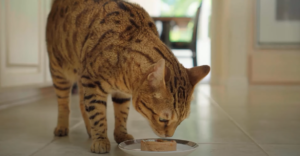
Trust & Safety
Another significant reason why your cat might insist on having you nearby when she eats is linked to her sense of trust and safety. In the wild, cats are both predators and potential prey. Therefore, mealtime is a vulnerable moment for them, as they must let their guard down to eat. By requesting your presence, your cat may be seeking a measure of safety and reassurance. Your presence implies that you’re on the lookout for any potential danger, allowing her to eat in peace. Furthermore, her insistence on having you around during meals also signifies a deep level of trust in you. It’s a compliment in feline terms, indicative of her seeing you as part of her ‘family’ or ‘clan’.
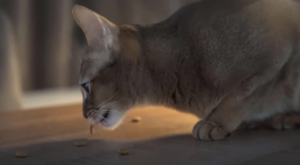
Social Eaters
Unlike dogs, cats are generally thought to be solitary eaters. However, this isn’t always the case. Cats can sometimes exhibit traits of being social eaters. In multi-cat households, it’s not uncommon for cats to gather together for meals. This social eating behavior can also extend to human members of the household. If your cat is seeking your company during meals, she might be demonstrating a form of social eating. Cats can form strong bonds with their human caregivers, and sharing mealtime may be one way your cat expresses this bond. It’s their version of a family dinner, so to speak. While this behavior doesn’t mean your cat expects you to chow down on some kibble alongside her, your presence at her feeding time is a form of social interaction that she values. [1]
Want To Be Petted
This reason is quite straightforward and heartwarming. Your cat may simply want to be petted while she eats. Studies have shown that many cats enjoy being petted and stroked during meals. This is seen as a moment of bonding, a way to express and receive affection. If your cat insists on your presence during meal times, she might be asking for a loving pat or a gentle stroke. While being petted, cats typically purr, close their eyes, and show other signs of contentment, which can be very soothing for them. Keep in mind, however, that not all cats appreciate being touched while eating, so it’s important to understand and respect your cat’s individual preferences. Nonetheless, if your cat enjoys this, it’s a beautiful aspect of your relationship that she cherishes, and it’s telling of the deep bond you share.
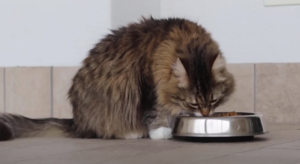
Afraid Of Missing Out
Another reason your cat may wish for your presence during meals could be due to a fear of missing out, also known as FOMO. Cats are naturally curious creatures, and your cat may want to ensure she’s not missing any exciting events while she’s busy eating. If she’s typically engaged in various activities around the house when you’re present, she might worry that she could miss out on something if you’re not within her sight. Your presence at meal times not only reassures her of her safety but also makes sure she’s included in any potential action. Remember, cats are highly social animals, and they like to be involved in their household’s activities. [2]
A Sign Of Love
Lastly, your cat wanting you to watch her eat could simply be a sign of her love for you. Cats are selective when it comes to showing affection, and if your pet wants you near during meal times, it’s a significant show of trust and love. Cats, especially domestic ones, form strong bonds with their human caregivers. When she invites you to be a part of her feeding routine, it’s her way of showing you that you’re an important part of her life, an integral member of her family. She may also associate your presence with the satisfaction she feels from eating. All these actions are her unique way of expressing her affection towards you.
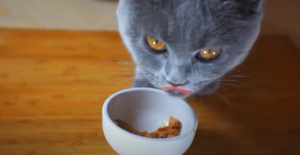
Illness
While the reasons listed above are usually benign and related to your cat’s social and emotional needs, there’s a chance that her insistence on your presence during meals could be indicative of an underlying health issue. If your cat is suddenly showing a heightened dependence on your presence during feeding, it may be because she’s feeling unwell.
It could be anything from dental problems making it painful to eat, to more serious illnesses like kidney disease or diabetes. If your cat is showing other signs of illness such as lethargy, vomiting, or weight changes, it’s crucial to seek veterinary care immediately. In such cases, your cat’s request for company during meals isn’t just about social bonding or habit – it could be a call for help. [3]
What To Do If Your Cat Won’t Eat Without You Watching
If your cat won’t eat without you watching, there are a few considerations and steps you can take to help her. Firstly, try to accommodate her needs when possible. If your schedule allows it, spend the required time with your cat during her meals. After all, this is an expression of trust and bonding from your feline friend.
If your schedule doesn’t permit you to be present at all mealtimes, try arranging feeding times around when you are typically at home. Using automatic feeders that go off at a set time can also help establish a routine, and this predictability can be comforting to your cat.
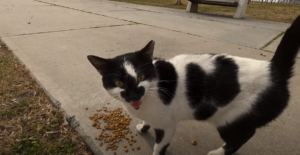
If you’ve noticed a sudden change in your cat’s behavior regarding feeding times, and especially if it’s accompanied by other unusual behaviors or symptoms, it’s best to consult with a veterinarian. This could be indicative of an underlying health problem that needs immediate attention.
What To Do If Your Cat Won’t Eat
If your cat won’t eat, it’s essential not to ignore this behavior as it could be a sign of underlying health issues. Cats often stop eating due to a variety of reasons ranging from minor issues such as stress or dislike of a new food, to more serious health concerns such as dental problems or kidney disease. Here are some steps you can take if your cat won’t eat:
- Try Different Foods: Sometimes, cats may refuse to eat because they simply don’t like the food you’re offering. Consider trying a different brand, flavor, or type of food. Make sure the food is appropriate for your cat’s age, breed, and health status.
- Check for Dental Problems: Dental issues can make eating painful for cats. If your cat is suddenly showing reluctance to eat, it’s a good idea to check her mouth for any signs of dental problems such as swollen gums, bad breath, or discolored teeth.
- Reduce Stress: Changes in the environment can cause stress, which can lead your cat to stop eating. If there have been recent changes in your household, try to restore the familiar environment that your cat is used to.
- Consult a Veterinarian: If your cat refuses to eat for more than 24 hours, it’s crucial to seek professional help. Long periods without eating can lead to serious health problems in cats. Your veterinarian can diagnose if there is any illness causing this behavior and suggest a treatment plan. [4]
How Affection Eating Can Help A Cat Who Won’t Eat
‘Affection eating’ is an approach that capitalizes on the bond between a cat and its caregiver, and can sometimes be a useful tool in encouraging a cat who won’t eat. Basically, ‘affection eating’ involves providing your cat with emotional support and companionship during meal times, which can in turn stimulate her appetite. This concept is rooted in the strong social bonds that cats can form with their human caregivers.
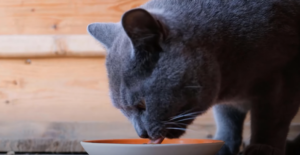
When a cat refuses to eat, it can often be due to stress or discomfort. Offering your comforting presence during mealtimes can help alleviate these feelings. Additionally, petting your cat, speaking to her in gentle and soothing tones, or even offering the food by hand can help create a positive association around eating.
Things To Remember About Cats And Food
Cats have unique dietary needs, and understanding these can make a considerable difference in their health and happiness. Here are some key things to remember about cats and food:
- Cats are Carnivores: Cats are obligate carnivores, which means their bodies require a diet of primarily meat. Their nutritional needs are specific, requiring nutrients like taurine and arachidonic acid, which are naturally found in animal tissues.
- Hydration is Important: Many cats often don’t drink enough water. Feeding them wet food can help increase their water intake, which is beneficial for their urinary and kidney health.
- Portion Control is Key: Overfeeding can lead to obesity, which can cause numerous health problems. It’s important to follow feeding guidelines according to your cat’s weight and age.
- Age-Appropriate Nutrition: Kittens, adults, and senior cats have different dietary needs. Ensure you’re feeding your cat food that’s appropriate for her life stage.
- Regular Vet Checks: Regular vet checks can help monitor your cat’s weight and overall health condition. This allows for any nutritional adjustments as needed.
- Know the Signs of Food Allergies: Some cats can be allergic to certain types of food, which can cause skin irritations, digestive issues, or other health problems. Always monitor your cat for any negative reactions after introducing a new food.
- Patience with Picky Eaters: Some cats can be picky eaters. If this is the case, patience is key. Try introducing new foods slowly and always ensure they have access to their old food to avoid hunger strikes. [5]
FAQ
Why do cats wake you up to watch them eat?
Cats may wake you up to watch them eat due to a behavior known as ‘social facilitation’ or ‘vicarious eating.’ Essentially, in the wild, cats are both predators and prey. Eating alone can make them feel vulnerable, so having a trusted companion nearby can offer a sense of security. So, when your cat wakes you up to join her during meal times, she’s expressing trust in you and seeking your companionship for a comfort-based ritual. However, if this behavior becomes troublesome or seems to be driven by anxiety, it’s best to consult with a veterinarian or a pet behaviorist.
Why does my cat beg for food when her bowl is full?
Cats sometimes beg for food even when their bowls are full due to various reasons. One possibility could be that they are not enjoying the taste or texture of the food you’re providing, hence their continuous begging for something more appealing. Another reason could be behavioral. Cats are clever and known to associate certain behaviors with rewards. If begging has previously resulted in treats or more palatable food, they might continue doing so.
Why does my cat want me to go outside with her?
Your cat might want you to accompany her outside for several reasons. Firstly, cats are territorial animals, and having their trusted human by their side can make them feel more confident and secure when exploring outside. Secondly, if your cat is an indoor cat and not used to the outside world, going outside with you can be a comforting experience as they navigate unfamiliar territory. Also, your presence can serve as a deterrent for potential threats such as other animals. Lastly, cats have a strong sense of companionship and may simply enjoy your company.
Why won t my cat eat unless I watch him?
If your cat won’t eat unless you watch him, it’s often because they find your presence comforting and reassuring. Cats are vulnerable when they eat, so having a trusted human nearby can make them feel secure. This behavior, termed “social facilitation,” can trace back to their wild ancestors, where it could be risky to eat alone due to potential predators. In some cases, your cat might also be seeking your attention or validation. However, if this behavior is new or accompanied by other changes in behavior or physical condition, it might indicate a health issue.
Do cats get jealous when we eat?
Cats may appear to get jealous when we eat, but it’s not jealousy in the human sense. Cats aren’t capable of feeling the complex emotion of jealousy, but they can feel left out or interested in what you’re doing. If your cat is suddenly showing interest when you’re eating, it’s often due to the appealing smell of the food or curiosity about your actions. In some cases, your cat might associate your meal times with potential treats or their own feeding times, so they may become more attentive. It’s important not to reward this behavior with food from your plate, as many human foods can be harmful to cats. If your cat is disruptive during your meals, try providing them with a toy or their own meal during your eating times.
Why won’t my cat eat if I’m not in the room?
Your cat may not eat if you’re not in the room due to a behavior known as ‘social facilitation.’ This behavior stems from their wild ancestors where eating alone could expose them to predators. Having a trusted companion nearby while they eat makes them feel safe and secure. On a more basic level, your presence could simply mean that mealtime is about to happen, and they are waiting for you to serve their food. However, if this behavior is sudden or if your cat shows any signs of distress, anxiety, or physical discomfort, it could be a sign of an underlying health issue or separation anxiety.
Do cats know you’re eating?
Cats certainly have an acute sense of awareness and can often tell when you’re eating. Their keen sense of smell and natural curiosity may lead them to notice when you’re preparing or consuming food. They associate the sounds of kitchen activity with potential food availability. Moreover, if you have previously shared food with them or fed them at similar times to when you eat, they may have formed a behavioral association. However, it’s important to remember not to share most human foods with cats as many can be harmful to them. If your cat appears overly insistent or disruptive during your meal times, consider providing them with a toy or feeding them their own meals simultaneously to distract them.
Should I pet my cat while eating?
While it’s natural to want to show affection to your cat, it’s generally best to avoid petting them while they are eating. Cats are instinctively protective of their food due to their predatory nature. Disturbing them during meal times could make them feel anxious or threatened, potentially leading to stress-related behavioral issues. Moreover, it could interrupt their eating patterns, which might have implications on their health and well-being. If you want to show affection, consider petting your cat before or after meals when they’re more relaxed. However, every cat is unique and some might actually enjoy being pet while eating. It’s crucial to observe your cat’s reactions and respect their preferences. If you notice any unusual behavior or changes in eating habits, it’s advisable to consult with a vet.
Why does my cat never finish her food?
There could be several reasons why your cat never finishes her food. Firstly, it might simply be that she is not hungry. Cats are small animals and do not require a large amount of food. Overfeeding is a common issue with indoor cats. Ideally, you should follow the feeding guide on the cat food packaging or consult with your vet. Secondly, your cat may prefer smaller, more frequent meals throughout the day — a behavior known as ‘free feeding.’ Thirdly, if the food has been sitting out for a while, it may have lost its appeal. Cats prefer fresh food, and some can be quite particular about it. Lastly, if your cat is leaving food consistently, it could be a sign of dental problems or other health issues. If your cat has suddenly stopped eating, is losing weight, or shows any other signs of illness, you should consult with a vet immediately.
Why does my cat act like she’s starving every time I feed her?
Your cat may act like she’s starving every time you feed her due to a variety of reasons. Firstly, cats are known for their hunting instincts, which include a strong drive for food. This behavior can sometimes seem like desperation or ‘starvation,’ especially if food is a primary source of interaction between you and your cat. Secondly, your cat may have been conditioned to associate your presence or specific actions with feeding time, causing them to respond eagerly. Thirdly, certain medical conditions, such as hyperthyroidism or diabetes, can cause increased hunger in cats. If your cat’s appetite has noticeably increased, it’s important to consult with a vet to rule out any potential health issues. Lastly, stress or anxiety could also lead to changes in your cat’s eating behavior. If the ‘starving’ act is accompanied by other changes in behavior, a vet consultation is recommended.
Useful Video: THAT’S WHY Cats Want You To Watch Them EAT!
Conclusion
Understanding your cat’s eating behaviors can be a fascinating journey into their unique personalities and instincts. From their seemingly insatiable hunger at feeding times to their desire for you to be present during meals, cats exhibit behaviors that can often be traced back to their wild ancestors. Always remember, while it’s important to respect their instincts, any sudden changes or extreme behaviors should prompt a consultation with a vet to rule out any potential health issues. It’s not uncommon for cats’ dietary habits to reflect their overall health and well-being. By observing and understanding these behaviors, you can ensure that your feline friend leads a happy, healthy, and fulfilling life.
References:
- https://www.thedodo.com/dodowell/why-does-my-cat-want-me-to-watch-her-eat
- https://www.catster.com/lifestyle/affection-eating-and-cats
- https://mrbosscat.com/cat-want-me-to-watch-her-eat/
- https://cats.com/why-does-my-cat-want-me-to-watch-her-eat
- https://fursnpaws.com/why-does-my-cat-want-me-to-watch-her-eat

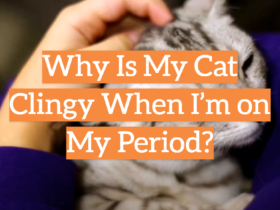
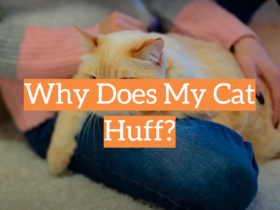
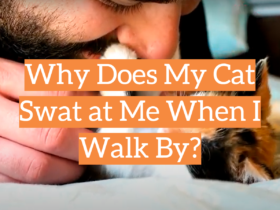
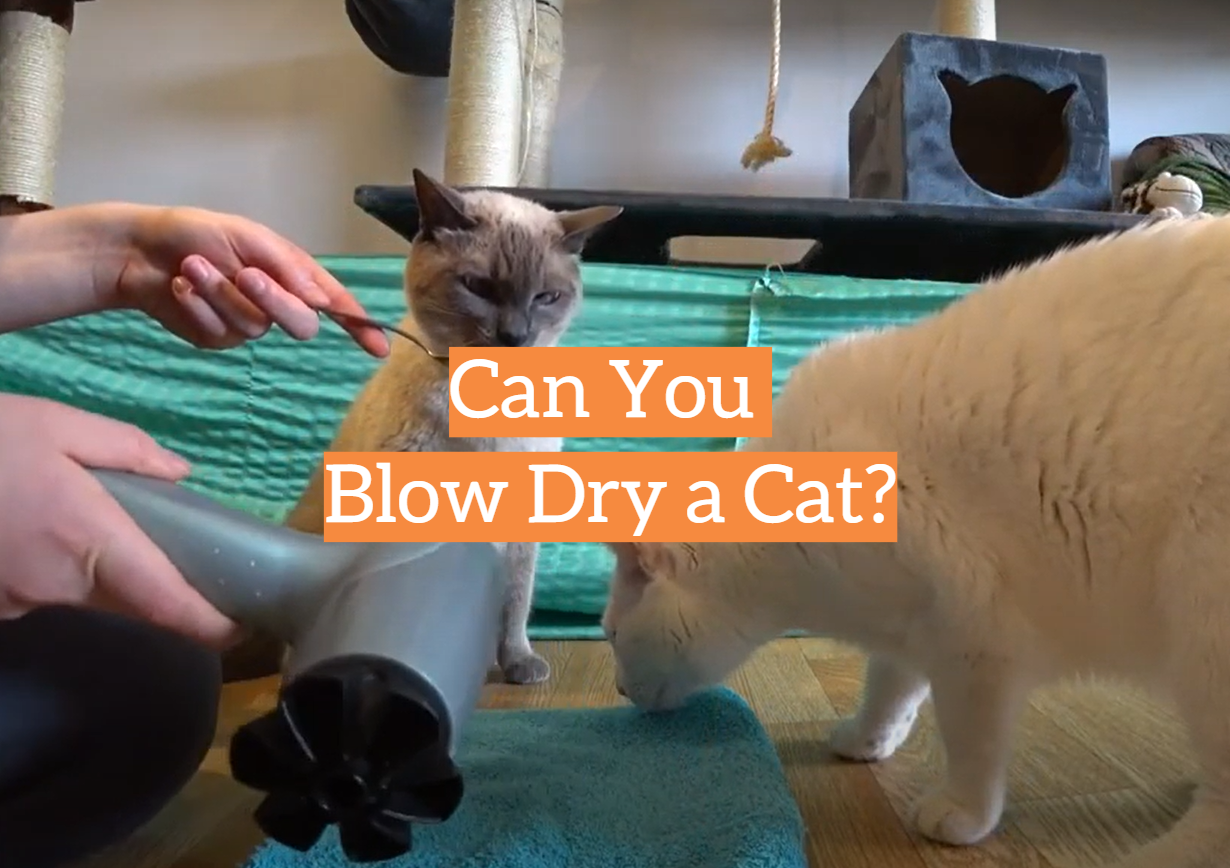
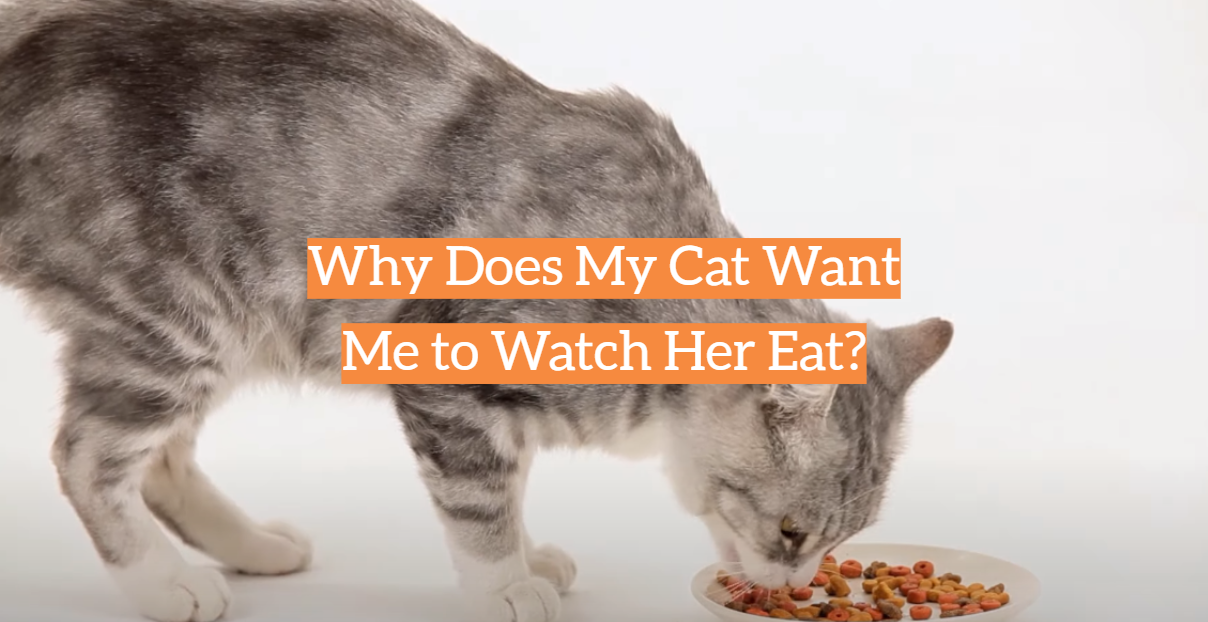
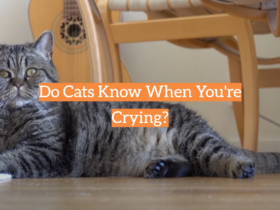
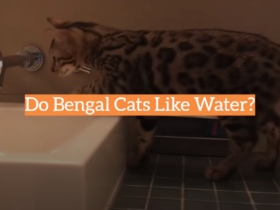
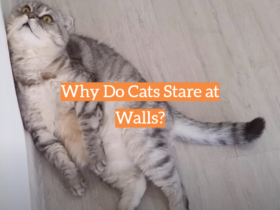
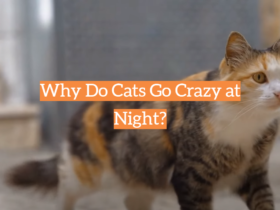
Leave a Reply